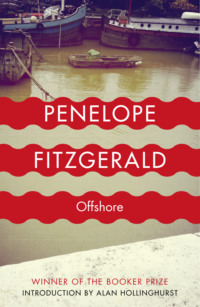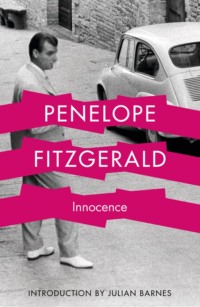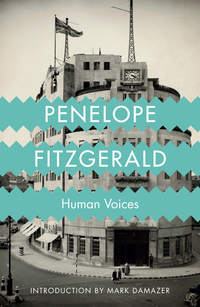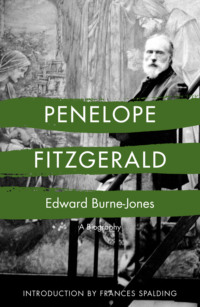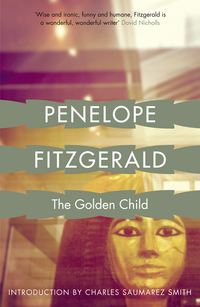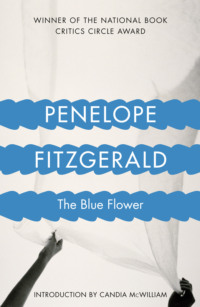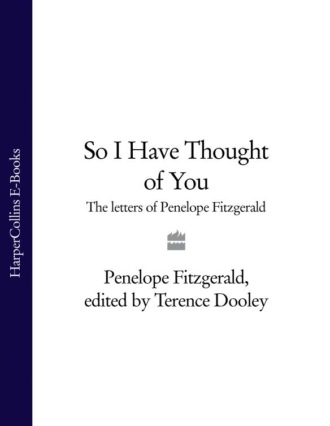
Полная версия
So I Have Thought of You: The Letters of Penelope Fitzgerald

So I Have Thought of You
The Letters of Penelope Fitzgerald
Edited By Terence Dooley
Preface by A.S. Byatt

Will dich im Traum nicht stören,
Wär schad un deine Ruh.
Sollst meinen Tritt nicht hören –
Sacht, sacht die Türe zu!
Schreib im Vorübergehen
Ans Tor dir: Gute Nacht
Damit du mögest sehen
An dich hab” ich gedacht.
An dich hab” ich gedacht.
Table of Contents
Cover Page
Title Page
Epigraph
PREFACE BY A.S. BYATT
INTRODUCTION
A NOTE ON THE TEXT
I. FAMILY AND FRIENDS
Hugh Lee (’Ham’)*
Tina Fitzgerald*
Maria Fitzgerald*
Maryllis Conder (’Willie’)*
Rachel Hichens and Elizabeth Barnett*
Mary Knox*
Helen Knox*
II. WRITING
Richard Garnett*
Harold Macmillan*
Mavis Batey*
Malcolm Muggeridge*
Colin Haycraft*
Francis King*
Norah Hartley*
Mary Lago*
J. Howard Woolmer*
Richard Ollard*
Stuart Proffitt*
James Saunders*
Graham Chesney*
A. L. Barker*
Harvey Pitcher*
Frank Kermode*
Hilary Mantel*
Bridget Nichols*
Alyson Barr*
Dorothy Coles*
J. L. Carr*
Sybille Bedford*
Julian Barnes*
Michael Holroyd*
Alberto Manguel*
Masolino d’Amico*
Richard Holmes*
Mandy Kirkby*
Chris Carduff*
The Kitchen Drawer Poem
Index
Acknowledgements
Also by Penelope Fitzgerald
Copyright
About the Publisher
PREFACE BY A.S. BYATT
Penelope Fitzgerald and I taught together in the 1960s at the Westminster Tutors, an institution which prepared students, almost all female, for the long-abolished Entrance Exams to Oxford and Cambridge. We sat together in the small staff room on sagging sofas, amid a rich and pervasive smell of old upholstery and decaying dogs. Penelope was contradictory. She could appear vague and self-effacing and was. She could also say formidably knowledgeable and percipient things about literature. She was generous and exacting. She once rebuked me for not understanding that one of her pupils had a touch of genius. It was a concept that meant a great deal to her, which I did not understand at the time. It did not occur to me, young as I was and obsessed with literature and small children, that she might herself have more than a touch of genius. I don’t know if it occurred to her. I didn’t know her very well. She was interesting to know, but not easy to get to know well.
Her son-in-law, Terence Dooley, points out wisely in his introduction to this collection of letters, that friends and relations of novelists are not always best pleased when they first discover that, and what, the novelists have been writing. I was surprised, and pleased, as I struggled on with my own children and my own teaching and my own need to write, to see that Penelope had become a novelist. I had not been surprised to be told that she had written a biography of Burne-Jones. She was just and scholarly. I had not read her other biographies. When she won the Booker Prize with Offshore I was delighted, and immediately read it. (I did not know that this prize was to be such a trouble and such a problem to Penelope, until I read Terence Dooley’s account of it.) I think I then read almost all her books, more or less as they came out. I admired them. They had a finished, separate quality. They were works of art, in excellent prose. They were funny and terrible. I did not ask whether they had anything to do with her life – whether she had owned a houseboat that sank, or a bookshop. There was something self-sufficient about even those early works. The writer knew exactly what belonged in a particular tale, and how to arrange it. I admired the craft, still without thinking of genius.
She said to me about Human Voices that she wished I would write something in the TLS or somewhere to point out that it was based on a German poem, by Heine, ‘Der Asra’. I hadn’t noticed that, and I don’t know how she expected anyone to do so. ‘Asra’ to me was Coleridge’s transposition of Sara in his diaries and love letters. But I felt challenged, and I reread Human Voices, and I read ‘Der Asra’, a perfect, moving, chilling, brief poem and I saw that Penelope Fitzgerald was not an English lady writer – in a lot of these letters she is putting on an act as one – but someone with an austere, original talent, unlike anyone else writing in this country at this time. I don’t think I then said ‘genius’ to myself. It isn’t a word I much use.
In the light of these letters we can see what parts of Fitzgerald’s own life served as raw material for the earlier novels. This makes me, as a writer and reader, feel uneasy. The connections, the sources, are there, and yet there is something hermetic, something completed, about good novels of the kind Fitzgerald wrote. Deliberately personal novels like Dundy’s The Dud Avocado or Jong’s Fear of Flying almost take off from their authors’ lives and flow back into them. Fitzgerald had made messy life into finished art – even if it was a finished observation about the messiness of life.
It was when I read the last three novels, Innocence, The Beginning of Spring, and The Blue Flower, that I came to understand – hindered by the fact that I had met her long before I read them – that she was a great writer. Each is different; each takes a whole world of history, knowledge, politics and literature and turns it into something at once suggestive and complete, full of newly created people and newly connected ideas. One is Italian, one is Russian, one is German. All are about tragi-comic, fallible human beings living personal lives in a world that is political and spiritual, which is sketched in with the sureness of an artist who knows enough (which means a very great deal) to know exactly what details of daily life, or philosophical thought, to put elegantly in place to make a whole. This is perhaps most remarkable of all in Von Hardenberg’s Prussia. She told me once she had read the records of the salt mines from cover to cover in German to understand how her hero was employed – and then in a few sketched details she places the mines, in his daily life and in his thought about the scientific and spiritual world.
It was at this point only that I read The Knox Brothers, her biography of her father and uncles. I read the book looking for its author, not for its subjects. And I have come to see how much the austere perfectionist – with a wicked sense of humour – is descended from that family of bishops, saints, dons, idealists, intellects. She effaces herself, referring to her birth only as that of a ‘daughter’, and her observations (only about twice, moreover) as those of ‘a niece’. I’m not sure I’ve read a better- written biography. The quality of the writing is derived partly from an exact, matter-of-fact, wildly funny wit in the descriptions. The other part comes from a scrupulous respect for the spiritual lives, as they themselves saw them, of the four brothers. Hermione Lee once asked her in an interview if she would say anything about her feminist or political beliefs. Fitzgerald corrected her; she hoped the readers would be interested in her spiritual beliefs.
The Knox Brothers opens with their grandfather, the missionary Thomas French, who travelled and died taking Christianity to the Afghans and the North West Frontier. Penelope Fitzgerald comments:
Today he would certainly be asked: why not leave these people to their own beliefs? Why press on them something they did not ask for and do not want? To this his reply would be: ‘The viewing of the unseen world instead of the visible things of time – this cannot be a shallow matter; it must be deep or not at all – no halves in such a business.’
The four brothers, in very different ways, inherited this absolute vision. Ronald Knox became a Catholic and distressed his father, an Anglican bishop. Wilfred made unworldly, precise vows of poverty and celibacy and joined the (Anglican) Oratory of the Good Shepherd. Penelope Fitzgerald comments sharply on people who saw him as a delightful eccentric, unconcerned like the birds of the air:
This idea was particularly irritating. Wilfred was the young man who had chosen his ties in the Burlington Arcade, and he loved good wine, good tea and the best tobacco. But renunciation must never be seen in terms of loss.
Dillwyn, a mathematician who helped break the codes of the Enigma machine, was as resolute an unbeliever as those two brothers were believers. Penelope respects that. She describes him in 1916, recruiting Ronnie – ‘an unlikely figure in clerical garb’ – to Naval Intelligence:
To Dilly, all the long-drawn out [family] suffering over his youngest brother was a matter of unrealities; we pray, no one answers, the Churches dispute to the death over how to go on speaking to someone who is not there.
It is in Dillwyn’s logical and startling company that ‘his niece, confined for what seemed an eternity to a boarding school at nearby High Wycombe’, makes a rare appearance. He brings her back late, and confronts the outraged housemistress, who said ‘Rules are made to be kept’, with the answer: ‘But they are defined only by being broken.’
It has rightly been said that Penelope wrote wonderfully about children. Terence Dooley makes the caveat that she liked children, not when they were babies or infants, but ‘when they had reached the age of reason’. (’Ronnie’s niece’ makes another appearance, rebuked by Evelyn Waugh for wanting to leave Ronnie’s sixtieth birthday party early ‘to look after her baby’. Waugh ‘snapped "Children! Nonsense! Nothing so easily replaceable."’)
She tells us, of the Knox family, when their mother was sickening: ‘There was an atmosphere, so frightening to children, of things not being quite right, and of discussions behind closed doors.’ She says of her father that ‘the blow of this death was one from which, in a very long life, he never quite recovered. It gave him, at twelve years old, a spartan endurance and a determination not to risk himself too easily to life’s blows, which might, at times, have been mistaken for coldness.’
The children in whom Penelope, as a writer, is most interested are indeed – like the Knoxes – like Penelope herself: beings who combine clarity of thought with a sense of the existence of the unseen world. They are also perfectionists. The boy actor, in At Freddie’s, practising a jump from a wall again and again may well have died in the search for perfection. Both Hardenberg and his young brother have the same absolutism. They inconvenience others, damage them even, yet are to be loved and understood and respected. There is something of the same quality in the midget child in Innocence, and by extension in the young Italians in that book. The quality is indeed a form of innocence. There is a comic version of it in the boy, observed by Penelope’s father at Rugby, who stopped the school clock with an accurately aimed squash ball. It turned out that the boy had been practising the shot for two years. The headmaster called this ‘un-English’.
Eddie did not agree. The patient, self-contained, self-imposed pursuit of an entirely personal solution seemed to him most characteristically English.
It is in this sense – for she resembled her family, and knew it, as well as observing it clearly – that Penelope Fitzgerald is an English novelist. She is not a novelist of manners, though she observes them wickedly, nor of class, though she understands it. She writes very English versions of European metaphysical fables, embodying them in idiosyncratic reality.
I spoke to her, possibly for the last time, at one of the award parties for the Cohen Prize. She looked distracted, as she usually did at parties. I asked her if she was writing, and she looked at me searchingly and asked: ‘How do you think of a novel?’
I don’t know how she thought of the ones she wrote. I don’t know what they can have been like in the planning – they seem as though they had to be as they are. She made it appear a question of extreme difficulty. I do not think reading her letters will really answer it either – though they illuminate other things. Instead, their reader will enjoy being in the company of Penelope’s courtesy and intelligence. And then will ask for him or herself: ‘How do you think of a novel?’ And understand the difficulty of the question.
INTRODUCTION
I: Family and Friends
Penelope Fitzgerald was shy and awkward with anyone who was not an old friend or a family member. If writers are often monsters of egoism, she was not. Confident only in her fearsome sense of artistic rightness and in her abundant knowledge, she had no great conceit of herself; she feared herself ineffective socially, a voice unlikely to be heard. In person, one felt her reserves of sharp kindness, intelligence and sympathy. She was stern. She willed one to come up to the mark. She could be devastatingly funny.
In letters she could say all that she wanted to say, and couldn’t quite face to face. She did so in a way that was truthful, witty and persuasive, but above all focused on the person she was writing to. She intended to be entertaining, to offer consolation or to celebrate. She is vividly alive in these letters, and, because she has their recipients so clearly in mind, their characters become clear to us too. Though she writes eloquently, she is unselfconscious and unguarded – it is quite evident that she wrote without thought of publication. It was part of her modesty that Penelope left no instructions about what should or shouldn’t be published after her death. I think these letters will give her readers, without the frisson of gossip and malice, a rounded picture of what she was really like, a sense of the passage of her days, an impression of her career and interests, and the same pleasure they gave to those who first opened them.
Who could have predicted a time when the epistolary art would cease to be a part of ordinary communication, and would pass into history? Every morning when Penelope first sat down at her writing-table she attended to her correspondence. What is collected here must be a small fraction of what she in fact wrote and sent.
Her fame came so late in life that there was no reason for anyone to keep her letters, apart from affection, and she lost her personal records, including her husband Desmond’s and her (copiously illustrated) letters, written when he was serving overseas, when the family’s houseboat, Grace, sank for the second and last time, in 1963, which also made it difficult to trace Hampstead and Suffolk friends from the earlier, more prosperous periods of her married life. There is therefore a hole in the middle of this collection which engulfs her work as a programmes assistant at the BBC, the early years of her marriage, her editorship of World Review, her child-bearing and -rearing years, and her financial disasters. The years when, as Cervantes said to explain his own long silence, she was living her life: the years before she came to write.
I was fortunate when I began on this book to be given two meticulously kept series of letters: that of Chris Carduff, Penelope’s American editor at Addison Wesley and then at Houghton Mifflin, and that of J. Howard Woolmer, bookseller and bibliographer, who corresponded with Penelope about the Poetry Bookshop in Bloomsbury and who brokered the sale of her papers to the University of Texas. A third and most fascinating series was sent to me by Hugh Lee – known as ‘Ham’ for his perceived acting abilities – and covers the early war years when Penelope was just down from Oxford and working for Punch and then for the Ministry of Food. She had met Ham through her childhood friend, Jean Fisher. They formed part of a set of young Oxford graduates, the men training to be officers, those women who had not joined up drafted into the ministries. It was a time of amitiés amoureuses, with Penelope an ever-sympathetic confidante when these went wrong, and an unquenchable babbling brook of light-hearted, fantastic invention. The letters are full of gaiety and exuberance, and, despite the sombre times, are without the darker notes of her later writing. They give a rare glimpse of what the children’s generation never know about their parents: what they were like when they were young and silly and brimming with hope.
They break off about the time Penelope was falling in love with Desmond Fitzgerald, himself a recent Oxford graduate, and, like Ham’s group, a year younger than her. A few months after they married he went off to fight with the Irish Guards in North Africa. He was awarded the MC for holding Hill 212 in the face of terrible odds, a battle that led to the capture of Tunis. He would have received the Victoria Cross, but for the dreadful technicality that he was the only surviving officer. ‘It was lonely on that hill,’ he wrote later in his History of the Irish Guards, the hill now marked by a large white cross bearing the names of those killed there and the words Quis separabit? Ever after he suffered nightmares, and he found it difficult to adapt to civilian life.
Twenty-three years pass between the last letter to Hugh and the first to Tina, her elder daughter. There was never any distance between Penelope and the page, so that to read one of the flimsy blue airmail forms in her beautiful blue italic hand, one and a half pages with an arabesque border of afterthoughts, and every corner filled, was and is to feel her beside you. And, I wondered, thinking back to 1970, when I first read one over Tina’s shoulder, and remembering the delightful letter itself, and all it contained, how many of them she might have saved from all our travels and moves. Happily, there were a good many, scattered through drawers, cupboards and attics, interleaved with a miscellany of memories. They begin the year after Grace sank, when she was putting her life back together after eight years of free fall, and afford glimpses of her early literary adventures. We also see her imagination taking flight in her places of retreat: St Deiniol’s library in Hawarden, with its Burne-Jones connections, and the abbey on Iona, and on the package holidays she was now able to take, thanks to Desmond’s job with the travel firm Lunn Poly, despite the desperate scrimping – hair dyed with tea bags, Green Shield stamps saved for small comforts – that plagued her everyday life. We also get, as in the series of letters to her younger daughter, Maria, a most moving portrait of motherhood, which always took precedence over literature for Penelope.
I was talking one day to Maria about the (often furious) parental rows she remembers from the early years of her childhood, over bills unpaid, repossessions looming, and Desmond’s drinking, and about how secure the children nonetheless felt in the love of two kind, intelligent and funny people who simply couldn’t manage the world, despite their best efforts, so that it mattered less that they never knew where they would be living next, or where they would be going to school, there was a kind of adventure in it, when she suddenly absented herself and returned a little later from her cellar with a heavy black plastic bag. Inside was the complete set of letters her mother had written to her while she was up at Oxford, the only time in fact that they lived in different cities. All were in their postmarked envelopes, significant in that the letters are almost all undated as to year, and so exist in a seasonal but otherwise indeterminate present. There are two or three letters a week for each of her nine terms at the university and they provide an unusually detailed portrait of her state of mind at an unsettling period of her life when much was changing, and make on the whole for sadder reading than those to Tina:
‘Autumn: Departure of Daughters’
Oh my dark & light brown daughters
When you go to find new faces
Our place & me are put in our places
Our place may take what name it pleases –
It stares & stares, and all it sees is
That it is not a home.
Oh my dark & light brown daughters
When you go to find new places
Our place must face that it has no faces –
Tidiness, emptiness and peace is
All it has, and all it sees is
That it is not a home
Penelope put this poem away, in a drawer, without showing it to anyone, except these daughters. Its note continues to be sounded from time to time throughout the letters to her youngest child, the last to go away to find new places.
Now in her mid-fifties, she was working terribly hard: a full week’s teaching in two different jobs, three days at Queens Gate, Kensington, two days at Westminster Tutors, vast piles of exam-board marking as well as her own, with only Saturdays to spare for the mountainous research and writing of her first two books, the Burne-Jones and Knox Brothers biographies. After a difficult start (teaching R.E. at the stage school Italia Conti, remembered in At Freddie’s) she had become a valued and inspiring English teacher, the texts she was studying with her pupils – Jane Austen, but also Lawrence, Conrad, Forster, Joyce and Beckett, much modern poetry, philosophy, theory, history of art (we still have the tattered, meticulously annotated paperbacks) – all no doubt fuelling the future motor of her fiction. For, almost imperceptibly to her family, as she rarely spoke of work in progress, she was at last becoming what her old friends had always thought she would be: a writer, and this was confirmed by the acceptance of Edward Burne-Jones in 1973. It should have been an exciting and exhilarating time; intellectually and creatively it must have been, but personally it was a time of anxiety, loneliness and fear.
There had been ten years of comparative stability. Desmond and she had repaired their finances, made a rather stylish island home in their Clapham council flat, and seen their three children into and through Oxford. After the disasters of the previous decade, this had taken a great deal of persistence and bravery. Now they could say to each other: look, we have come through. A historian by training, he was able to help her in her research and they travelled happily together, at weekends and in the holidays, all over England, and to France, interviewing and absorbing atmospheres. In 1974 it became clear, though both delayed facing it (and their local GP was no help whatsoever), that Desmond was unwell. Penelope states barely in one of the later letters to Maria that she could not imagine living without one of her daughters nearby. The extent of her father’s illness, when it was eventually discovered, was kept hidden from Maria until she had completed her finals, but then she had to be told of his operation, in the reticent terms used in those days, which didn’t make anything any better.


